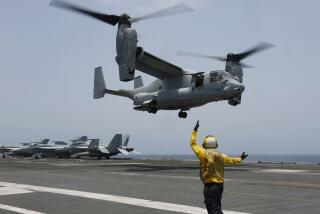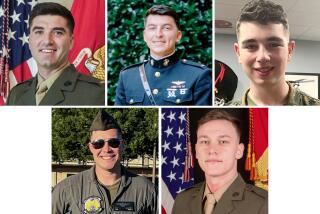CH-53 Pilot: ‘We Are Here to Stay’
- Share via
The recent (June 24) crash of a Tustin Marine CH-53 helicopter which was stationed in Okinawa has sparked renewed calls for the Marines to vacate Orange County and move elsewhere. I question the sincerity and thoughtfulness represented by such statements.
As a Marine CH-53D pilot stationed at Tustin until January, I am curious to learn how planning commissions or zoning laws could allow aggressive developers to build right up to airfield boundaries, or directly under clearly established flight paths. Moreover, in light of previously expressed concerns, I am amazed that these same agencies permit development which continues to encroach upon the fringes of long-established and heavily used airspace. It seems that, as a result of this shortsighted community planning, a quick-fix approach, which includes urging the Marines to leave, has again surfaced, advancing the same tired old arguments.
As a member of both the civil and military communities, I sympathize with the community’s genuine safety concerns. I assure you, as one who is an active part of the Marine helicopter community, that we pilots, both rotary and fixed-wing, are acutely aware of those concerns. The military has been more than accommodating in yielding to civil concerns by further restricting helicopter approach and retirement routes, implementing an aggressive program to identify and thereby avoid noise-sensitive areas, as well as earnestly addressing a myriad of community concerns to include the question of relocating. The question of relocating to Yuma, Twentynine Palms or Camp Pendleton has been thoroughly researched by appropriate authorities, but the results of that research, which is available to civil officials, will not support the relocation of helicopter assets. We are here to stay.
What is needed is not grand statements from elected officials or vested parties, but rather an understanding and mutual respect. I am sure the military will continue to accommodate the civil community’s concerns. On the other hand, the civilian community must realize that we aviators need unencumbered airspace to do our jobs and that continual encroachment without planning for aviation rights-of-way by uncaring developers serves neither community well.
Unfortunately, it has been my experience, as well as the general perception of my fellow aviators, that those efforts which steadily yet quietly affect better intercommunity relations are usually upstaged by ill-informed or uninformed parties more interested in the immediacy of their needs.
ANTHONY R. VANCHIERI
Captain
Marine Corps Air Facility
Quantico, Va.
More to Read
Sign up for Essential California
The most important California stories and recommendations in your inbox every morning.
You may occasionally receive promotional content from the Los Angeles Times.













